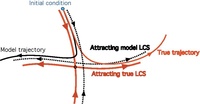
Photo from wikipedia
Abstract We consider the existence of parabolic invariant tori for a class of quasi-periodically forced analytic skew-product maps φ : R n × T d → R n × T… Click to show full abstract
Abstract We consider the existence of parabolic invariant tori for a class of quasi-periodically forced analytic skew-product maps φ : R n × T d → R n × T d : φ ( z θ ) = ( z + ϕ ( z ) + h ( z , θ ) + ϵ f ( z , θ ) θ + ω ) , where ϕ : R n → R n is a homogeneous function of degree l with l ≥ 2 and h = O ( | z | l + 1 ) . We obtain the following results: (a) For n = 1 , l being odd and ϵ sufficiently small, parabolic invariant tori exist if ω satisfies the Brjuno-Russmann's non-resonant condition. (b) For n = 1 , and ϵ sufficiently small, parabolic invariant tori also exist if one of the following conditions holds: (i) First order average is non-zero, first order non-average part is small enough and the forcing frequency ω does not need any arithmetic condition. (ii) First order average is non-zero and ω satisfies the Brjuno-type weak non-resonant condition; (iii) l = 2 , first order average is zero, both first and second order non-average parts are small enough and ω satisfying Brjuno-type weak non-resonant condition; (iv) l > 2 , first order average is zero, the second order average is non-zero, both first and second order non-average parts are small enough and ω satisfies the Brjuno-type weak non-resonant condition. (c) In the case n > 1 , if first order average belongs to the interior of the range of ϕ, S p e c ( D ϕ ) ∩ i R = ∅ , first order non-average part is small enough and the forcing frequency ω does not need any arithmetic condition, then the quasi-periodically forced skew-product maps above admit parabolic invariant tori for ϵ sufficiently small. The main methods of this paper are KAM theory and fixed point theorem, which are finally shown that it can be directly applied to the existence problem of quasi-periodic response solutions of degenerate harmonic oscillators.
Journal Title: Journal of Differential Equations
Year Published: 2021
Link to full text (if available)
Share on Social Media: Sign Up to like & get
recommendations!